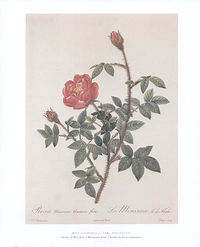Annotation:Moss Rose (1): Difference between revisions
No edit summary |
No edit summary |
||
| (2 intermediate revisions by 2 users not shown) | |||
| Line 1: | Line 1: | ||
---------- | |||
---- | {{TuneAnnotation | ||
|f_tune_annotation_title= https://tunearch.org/wiki/Annotation:Moss_Rose_(1) > | |||
'''MOSS ROSE [1], THE.''' English, Hornpipe. D Major. Standard tuning (fiddle). AABB. The melody appears in the music manuscript copybook of fiddler John Burks, dated 1821. Unfortunately, nothing is known about Burks although he may have been from the north of England. The moss rose is an annual from Brazil that grows about six inches tall with flowers about an inch across. It does well in sun, tolerates poor soil well, and is often used for ground covers and edging. The Victorians loved moss roses as cut flowers, decorating ball gowns and hats with them or tucking them into buttonholes. However, as the majority flower for about four weeks only, usually from mid-June to mid-July, they lost much of their popularity when modern, repeat-flowering roses were introduced. | |f_annotation='''MOSS ROSE [1], THE.''' English, Hornpipe. D Major. Standard tuning (fiddle). AABB. The melody appears in the music manuscript copybook of fiddler John Burks, dated 1821. Unfortunately, nothing is known about Burks although he may have been from the north of England. | ||
<br> | |||
<br> | |||
The moss rose is an annual from Brazil that grows about six inches tall with flowers about an inch across. It does well in sun, tolerates poor soil well, and is often used for ground covers and edging. The Victorians loved moss roses as cut flowers, decorating ball gowns and hats with them or tucking them into buttonholes. However, as the majority flower for about four weeks only, usually from mid-June to mid-July, they lost much of their popularity when modern, repeat-flowering roses were introduced. | |||
[[File:moss.jpg|200px|thumb|left|Pierre-Joseph Redoute botanical print. Red Moss Rose.]] | [[File:moss.jpg|200px|thumb|left|Pierre-Joseph Redoute botanical print. Red Moss Rose.]] | ||
<br> | <br> | ||
| Line 12: | Line 15: | ||
</blockquote> | </blockquote> | ||
However, as the flower was popular there are a number of songs and instrumental pieces that have "moss rose" in the title. | However, as the flower was popular there are a number of songs and instrumental pieces that have "moss rose" in the title. | ||
|f_source_for_notated_version= | |||
|f_printed_sources= | |||
|f_recorded_sources= | |||
|f_see_also_listing= | |||
}} | |||
Latest revision as of 21:32, 4 May 2023
X:1 T:Moss Rose [1], or a Hornpipe, The M:C| L:1/8 R:Hornpipe S:John Burks' music manuscript copybook, dated 1821 K:Bb AB/c/|d>cd>A F>AF>A|d>cd>A F2 (de/f/)|g>fg>e f>ef>d|c2A2A2 fe| d>cd>A F>AF>A|d>cd>A F2 (de/f/)|g>eg>e f>ef>d|A2d2d2:| |:fg|a>fa>f a>fa>f|b>gb>g e2 f>g|a3f (3bag (3fed|c2A2A2 f>g| a3f a>ga>g|b>gb>g e2 f>g|a>fa>f b>ge>c|A2d2d2:|]
MOSS ROSE [1], THE. English, Hornpipe. D Major. Standard tuning (fiddle). AABB. The melody appears in the music manuscript copybook of fiddler John Burks, dated 1821. Unfortunately, nothing is known about Burks although he may have been from the north of England.
The moss rose is an annual from Brazil that grows about six inches tall with flowers about an inch across. It does well in sun, tolerates poor soil well, and is often used for ground covers and edging. The Victorians loved moss roses as cut flowers, decorating ball gowns and hats with them or tucking them into buttonholes. However, as the majority flower for about four weeks only, usually from mid-June to mid-July, they lost much of their popularity when modern, repeat-flowering roses were introduced.

"The Moss Rose" is also the name of a song (in 6/8 time) dating to 1780 that begins:
'Twas in a flow'ry sweet retreat,
As Damon and Clarinda sat.
However, as the flower was popular there are a number of songs and instrumental pieces that have "moss rose" in the title.

